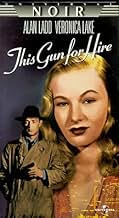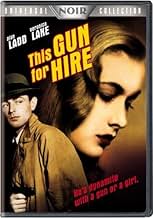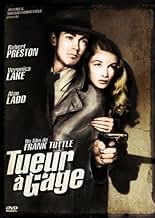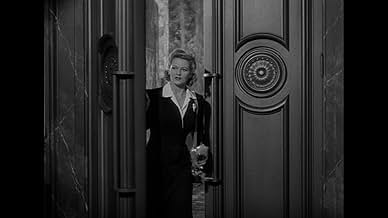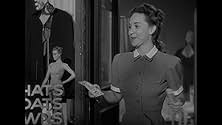NOTE IMDb
7,4/10
11 k
MA NOTE
Ajouter une intrigue dans votre langueWhen assassin Philip Raven shoots a blackmailer and his beautiful female companion dead, he is paid off in marked bills by his treasonous employer who is working with foreign spies.When assassin Philip Raven shoots a blackmailer and his beautiful female companion dead, he is paid off in marked bills by his treasonous employer who is working with foreign spies.When assassin Philip Raven shoots a blackmailer and his beautiful female companion dead, he is paid off in marked bills by his treasonous employer who is working with foreign spies.
- Réalisation
- Scénario
- Casting principal
- Récompenses
- 3 victoires au total
Olin Howland
- Blair Fletcher
- (as Olin Howlin)
Avis à la une
Frank Tuttle is one of those directors (like William Seiter) who is not consistently good, but who could do a terrific job now and then that retains our admiration. Seiter directed Laurel & Hardy in their best feature film, THE SONS OF THE DESERT (and turned in an above average job with the Marx Brothers in ROOM SERVICE). Tuttle did this film noir classic, and did it well. Based on a novel (or, as the author called it, an "entertainment") by Graham Greene, Tuttle made a star of Alan Ladd, and created the first of a series of films co-starring Ladd and Veronica Lake (as his cool, opposite number). He was ably abetted by a good cast of character actors: Laird Cregar, Tully Marshall, Robert Preston (at the start of his career), Marc Lawrence.... It was a terrific little thriller.
Laird Cregar's Willard Gates is one of the funniest neurotics in film noir. An overweight lady's man, he seems to go in both directions: using his money and nightclub to pick up women, and yet being a trembling tub of lard who enjoys reading "Naughty Paris at Night" while eating a box of chocolates in his private bedroom on his train. Cregar's Gates is augmented by his chauffeur - bodyguard - factotum Tommy, who has a wicked sense of ghoulish humor, and is able to make his queasy boss go nuts with fear just by describing a possible method of getting rid of Lake's prospectively dead body tied with cat gut that would disintegrate in a month (allowing her body to rise in a river, and leave her death a mystery. "Cat gut, what a horrible word!", quivers Gates. Marvelous - just look at Lawrence's grin as he speaks. He knows what he's doing.
The novel is a peculiar problem, not too frequently mentioned in discussing the film. It was set in 1935 in the midlands of England. At the beginning Raven is shown going to the office of a man who turns out to be Europe's leading peace advocate. He comes in using a letter from an unknown person. The peace advocate is happy at the recognition given to him by the letter's author and sits down to read it. In a moment Raven kills the man and then his secretary (who is a witness). This is changed in the movie to the murder of Baker, a blackmailer, and his girlfriend by Raven. The letter is from an important industrialist and munition dealer - Sir Marcus. His associate is the middle man between Sir Marcus and Raven, as Gates is in the film. But it is not in southern California in 1942 (and not dealing with treason with Japan). Instead Greene's villain is planning to help cause a new European War, for his profit.
Who is Sir Marcus? How is he different from the industrialist played by Tully Marshall? Marshall is a traitor for profit working for the Japanese Empire. Sir Marcus was Jewish.
Graham Greene and Evelyn Waugh were the two greatest English Catholic novelists of the twentieth century, but in different ways. Greene's novels dealt with the issues of good and evil in us all, usually told in stories of crime or spies. Waugh wrote of a fading Catholic English aristocracy, and had a masterful sense of comedy. They complement each other as writers. Both were deserving of Nobel Prize recognition, and both failed to achieve it. Other Englishmen did get the prize (Shaw, William Golding), but they never did - though repeatedly they were recommended for it. The possible reason was their open anti-Semitism. Waugh's novels are full of Jewish stereotypes, like Augustus Fagin in DECLINE AND FALL. Greene did the same, with Sir Marcus and Colleoni in BRIGHTON ROCK. The only difference is that Greene (in later years) edited out the anti-Jewish sentiments in the novels. But if you get the original novel you have Raven (a murderer-for-hire, mind you) telling off Sir Marcus about his ancestry before shooting him. The screenplay keeps to the storyline, with the American and non-religious changes. It was all to the good, but we all should be aware of Greene's religious bigotry.
Laird Cregar's Willard Gates is one of the funniest neurotics in film noir. An overweight lady's man, he seems to go in both directions: using his money and nightclub to pick up women, and yet being a trembling tub of lard who enjoys reading "Naughty Paris at Night" while eating a box of chocolates in his private bedroom on his train. Cregar's Gates is augmented by his chauffeur - bodyguard - factotum Tommy, who has a wicked sense of ghoulish humor, and is able to make his queasy boss go nuts with fear just by describing a possible method of getting rid of Lake's prospectively dead body tied with cat gut that would disintegrate in a month (allowing her body to rise in a river, and leave her death a mystery. "Cat gut, what a horrible word!", quivers Gates. Marvelous - just look at Lawrence's grin as he speaks. He knows what he's doing.
The novel is a peculiar problem, not too frequently mentioned in discussing the film. It was set in 1935 in the midlands of England. At the beginning Raven is shown going to the office of a man who turns out to be Europe's leading peace advocate. He comes in using a letter from an unknown person. The peace advocate is happy at the recognition given to him by the letter's author and sits down to read it. In a moment Raven kills the man and then his secretary (who is a witness). This is changed in the movie to the murder of Baker, a blackmailer, and his girlfriend by Raven. The letter is from an important industrialist and munition dealer - Sir Marcus. His associate is the middle man between Sir Marcus and Raven, as Gates is in the film. But it is not in southern California in 1942 (and not dealing with treason with Japan). Instead Greene's villain is planning to help cause a new European War, for his profit.
Who is Sir Marcus? How is he different from the industrialist played by Tully Marshall? Marshall is a traitor for profit working for the Japanese Empire. Sir Marcus was Jewish.
Graham Greene and Evelyn Waugh were the two greatest English Catholic novelists of the twentieth century, but in different ways. Greene's novels dealt with the issues of good and evil in us all, usually told in stories of crime or spies. Waugh wrote of a fading Catholic English aristocracy, and had a masterful sense of comedy. They complement each other as writers. Both were deserving of Nobel Prize recognition, and both failed to achieve it. Other Englishmen did get the prize (Shaw, William Golding), but they never did - though repeatedly they were recommended for it. The possible reason was their open anti-Semitism. Waugh's novels are full of Jewish stereotypes, like Augustus Fagin in DECLINE AND FALL. Greene did the same, with Sir Marcus and Colleoni in BRIGHTON ROCK. The only difference is that Greene (in later years) edited out the anti-Jewish sentiments in the novels. But if you get the original novel you have Raven (a murderer-for-hire, mind you) telling off Sir Marcus about his ancestry before shooting him. The screenplay keeps to the storyline, with the American and non-religious changes. It was all to the good, but we all should be aware of Greene's religious bigotry.
Phillip Raven (Alan Ladd) is a hit-man hired by Willard Gates (Laird Cregar) to execute the blackmailer Albert Baker (Frank Ferguson) and retrieve a letter and some documents for his unknown boss. When the work is done, Raven is double-crossed by Gates, receiving marked ten dollar bills. Gates delivers the list with the serial number of the bills to the police, expecting they find and kill Raven. Meanwhile, the performer Ellen Graham (Veronika Lake), who is the fiancée of the L.A Detective Lieutenant Michael Crane (Robert Preston), is contacted by Senator Burnett (Roger Imhof) and asked to help investigating Gates. She accepts the invitation, and is hired by Gates to work in his private club in Los Angeles. The police force, leaded by Det. Crane, chases Raven for the death of Baker; Raven chases Gates and his unknown boss, expecting to kill them for their betrayal; Ellen secretly chases Gates for the government. This is the beginning of a great classic. Alan Ladd and Veronica Lake have fantastic performances in this movie. Alan Ladd is magnificent in the role of a cold blood killer, needy of a friend, that loves cats. In order to show the personality of his character, there is a scene in the beginning of the story, where he almost shoots a crippled girl to eliminate any possible witness of his murder. Veronika Lake is wonderful and very gorgeous, inclusive singing two songs. I disagree with the reference of film-noir for "This Gun For Hire", since there is no "femme-fatale", no dirty cop, no weak man (other than Gates) or sordid motivation. Indeed it is a police story, showing a cold-blood hit-man without compassion, capable of killing without showing any emotion, hunting "worse guys" looking for his personal vengeance. My vote is eight.
Title (Brazil): "Alma Torturada" ("Tortured Soul")
Title (Brazil): "Alma Torturada" ("Tortured Soul")
one of the things that can make a film noir great is the ability to, at each turn, make the audience think that things are going to turn out okay, and then slam the door in its face. this film is able to do just that. alan ladd doesn't get the lead billing (that honor goes to lake and preston), but make not mistake - he is the star of the film. he plays a loner hit-man and we pick up the action just before he's set to do a job. he holds up his end of the bargain, but the man who hired him pays him in marked bills in an attempt to pin a robbery on him. ladd goes on the lam, but runs into the girlfriend (lake) of a cop (preston) who is after him for having passed one of the marked bills. little does ladd, or even preston, know, but lake has been enlisted by the government to do some investigative work on the man who paid ladd for the hit with the marked dough. it's quite a criss-crossed story, but it's all very easy to follow and very fun to watch while it unfolds. lake is sworn to secrecy because of the sensitive nature of her investigation, and she has no idea that the man she meets on the train (ladd) is the same man her boyfriend is pursuing. it's not as dark a noir as detour, but the ending is surprisingly affecting and certainly dark enough to qualify as a noir. the lighting is more subtle than it is in some noir and i made a note of looking into the cinematographer on this film. my hunch was right - john seitz did the cinematography for this and such films as invaders from mars, sunset blvd., double indemnity, sullivan's travels, and big clock. it's a crime that i've never heard of the guy. but i redeemed myself by finally looking into his work after watching this film. with sunset blvd and double indemnity i probably attributed the good lighting and camera work to billy wilder and the same is true for sullivan's travels and preston sturges. at any rate, this is a good film - ladd and lake do a good job, preston is capable; the cinematography is good even though it doesn't knock you over the head with its brilliance; and the story is well-constructed despite being a little far-fetched in places. B+.
THIS GUN FOR HIRE (TGFH, for short) is, without question, one of Hollywood's truly classic thrillers from the glorious 40's. It's a top-rate suspense flick, no doubt about that, and, personally, one of my all-time favourite flicks from that particular era. TGFH is jam-packed with plenty of hard-boiled action and death-defying drama. It's a 'Must See' for any Film Noir fan, like myself.
This would be Alan Ladd's first starring role as an actor. He'd been struggling to make it in Hollywood for nearly a decade. Ladd's widespread appeal as the hard-edged tough guy, Raven, in TGFH would, literally, catapult him into immediate stardom. Ladd's position as one of Hollywood's top male actors would endure for the next 10 years. Sadly enough, he would eventually die by his own hand from a deliberate overdose of alcohol and barbiturates in the early 1960's. Alan Ladd - Gone, but not forgotten.
Adapted from the Graham Greene novel of the same name, TGFH is a tough-edged story about love, power, and betrayal set in the seamy underworld of the 1940's.
Alan Ladd, as Philip Raven, plays a cold-blooded, professional killer who's been double-crossed and set-up for termination by his most recent client. It's only a matter of time before he's put out of action for good. But Raven ain't going down alone. No way. To avenge himself and the wrong done him, Raven must track down and eliminate, with extreme prejudice, those who want him out of the picture, permanently.
The tension mounts and before the night is over someone will be paying dearly with their life.
This Gun For Hire is a sure-fire hit!
This would be Alan Ladd's first starring role as an actor. He'd been struggling to make it in Hollywood for nearly a decade. Ladd's widespread appeal as the hard-edged tough guy, Raven, in TGFH would, literally, catapult him into immediate stardom. Ladd's position as one of Hollywood's top male actors would endure for the next 10 years. Sadly enough, he would eventually die by his own hand from a deliberate overdose of alcohol and barbiturates in the early 1960's. Alan Ladd - Gone, but not forgotten.
Adapted from the Graham Greene novel of the same name, TGFH is a tough-edged story about love, power, and betrayal set in the seamy underworld of the 1940's.
Alan Ladd, as Philip Raven, plays a cold-blooded, professional killer who's been double-crossed and set-up for termination by his most recent client. It's only a matter of time before he's put out of action for good. But Raven ain't going down alone. No way. To avenge himself and the wrong done him, Raven must track down and eliminate, with extreme prejudice, those who want him out of the picture, permanently.
The tension mounts and before the night is over someone will be paying dearly with their life.
This Gun For Hire is a sure-fire hit!
This is a great, compelling crime thriller that stands the test of time quite well. This would be one of the first movies I'd choose to show to a fan of recent movies who wants to explore classic thrillers but doesn't know where to start (along with "The Maltese Falcon" and one or two others). While many period pieces are "appreciated", this one still provides a jolt of adrenaline right from the opening scene, when Alan Ladd rips the maid's dress and slaps her. He's a bad man, no doubt about it, and his portrayal throughout most of the movie is surprisingly dark, even by today's standards. His character, Raven, is a man whose sole act of human compassion is not to murder a crippled orphan in cold blood, and Ladd's performance is underplayed just enough to make him chillingly believable.
This is a relatively early feature in the cycle that would later be called "film noir". A few films had begun to establish the new look and feel for the new generation of gangster movies, but the archetypal noirs were still a couple of years off. This movie is an interesting example of the early style because it visits the typical noir territory (culturally and emotionally) but avoids the stereotypical noir cast of characters. Rather than a flawed, weak man and a femme fatale, "This Gun For Hire" gives us a coldly amoral killer as the male lead and a tough, streetwise woman as the main "good guy" (her cop boyfriend spends most of the film running around frantically and accomplishing nothing).
Visually, this film is pure noir. It's directed by Frank Tuttle, who made the first version of "The Glass Key" in 1935, combining a hard-boiled gangster story and expressionist-influenced lighting. "This Gun For Hire" fits firmly into that mode, and shows that many of the stylistic trademarks of the supposedly "post-war" Noir style were firmly in place before the US had even been in WW2 for a full year. More importantly, it provides thrills, and a great dose of "the good stuff" in a neat, 81-minute-long package.
This is a relatively early feature in the cycle that would later be called "film noir". A few films had begun to establish the new look and feel for the new generation of gangster movies, but the archetypal noirs were still a couple of years off. This movie is an interesting example of the early style because it visits the typical noir territory (culturally and emotionally) but avoids the stereotypical noir cast of characters. Rather than a flawed, weak man and a femme fatale, "This Gun For Hire" gives us a coldly amoral killer as the male lead and a tough, streetwise woman as the main "good guy" (her cop boyfriend spends most of the film running around frantically and accomplishing nothing).
Visually, this film is pure noir. It's directed by Frank Tuttle, who made the first version of "The Glass Key" in 1935, combining a hard-boiled gangster story and expressionist-influenced lighting. "This Gun For Hire" fits firmly into that mode, and shows that many of the stylistic trademarks of the supposedly "post-war" Noir style were firmly in place before the US had even been in WW2 for a full year. More importantly, it provides thrills, and a great dose of "the good stuff" in a neat, 81-minute-long package.
Le saviez-vous
- AnecdotesAfter confronting the cops at the club, Raven takes Ellen hostage and flees. He finds a warehouse to hide in, but they must scale a wall. Raven helps Ellen to climb the wall, but he first warns her to stay on top until he gets there and not to run. She then replies, "Who do you think I am, Whirlaway?" Whirlaway is an American champion thoroughbred horse that won the U.S. Triple Crown in 1941, the year before this movie was released.
- GaffesWhen Gates discovers Graham and Raven sleeping on the train, Raven's head is on Graham's shoulder. The next shot after the one of Gates retracing his steps shows them separated. As Gates enters the car, Graham shrugs to move Ravens head off her shoulder. It's possible his head falls back on her shoulder as seen and then gets shrugged off fully between the next shit.
- ConnexionsEdited into Les cadavres ne portent pas de costard (1982)
- Bandes originalesNow You See It, Now You Don't
(1942) (uncredited)
Lyrics by Frank Loesser
Music by Jacques Press
Performed by Veronica Lake (dubbed by Martha Mears)
Meilleurs choix
Connectez-vous pour évaluer et suivre la liste de favoris afin de recevoir des recommandations personnalisées
- How long is This Gun for Hire?Alimenté par Alexa
Détails
- Date de sortie
- Pays d’origine
- Langue
- Aussi connu sous le nom de
- Un alma atormentada
- Lieux de tournage
- Richfield Tower - 555 South Flower Street, Los Angeles, Californie, États-Unis(Nitro Chemical headquarters building - demolished 1969)
- Société de production
- Voir plus de crédits d'entreprise sur IMDbPro
Box-office
- Budget
- 500 000 $US (estimé)
- Montant brut mondial
- 108 $US
- Durée1 heure 21 minutes
- Couleur
- Rapport de forme
- 1.37 : 1
Contribuer à cette page
Suggérer une modification ou ajouter du contenu manquant

Lacune principale
By what name was Tueur à gages (1942) officially released in India in English?
Répondre




